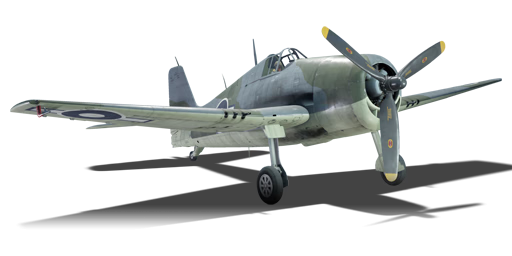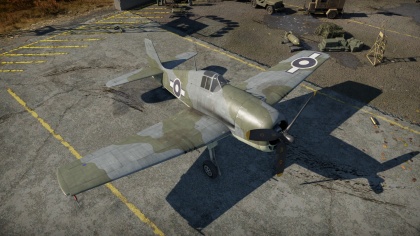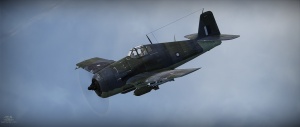Difference between revisions of "Hellcat Mk II (Great Britain)"
(Updated as of 1.89.1.170) |
|||
| Line 255: | Line 255: | ||
* ''other literature.'' | * ''other literature.'' | ||
| + | {{AirManufacturer Grumman}} | ||
{{Britain fighters}} | {{Britain fighters}} | ||
Revision as of 01:01, 31 December 2019
Contents
| This page is about the premium British fighter Hellcat Mk II (Great Britain). For other versions, see F6F (Family). |
Description
The ▄Hellcat Mk II is a premium rank III British fighter
with a battle rating of 3.0 (AB), 3.3 (RB), and 3.7 (SB). It has been in the game since the start of the Open Beta Test prior to Update 1.27 as the Hellcat Mk I, but was renamed to the Hellcat Mk II in Update 1.65 "Way of the Samurai". It costs 1,300 Golden Eagles.
The Hellcat Mk II is nearly identical to the American non-premium F6F-5 Hellcat, both can carry a wide array of weaponry for ground attack, but the Hellcat Mk II is at Rank III instead of Rank II like the American Hellcat, and has a good premium boost for Silver Lions ![]() and Golden Eagles
and Golden Eagles ![]() , making it an effective researcher for many British Rank 4 aircraft. Just like the American Hellcat, it is easy to get to grips with and can be very fun to play.
, making it an effective researcher for many British Rank 4 aircraft. Just like the American Hellcat, it is easy to get to grips with and can be very fun to play.
The stock F6F-5 Hellcat is equipped with six 12.7 mm Browning machine guns. The Hellcat can also be upgraded to carry either 6 x 127 mm rockets, 2 x 298 mm rockets, 2 x 1,000 lb bombs, or 6 x 127 mm rockets and two 1,000 lb bombs. The Hellcat can also be upgraded to use the "New 12 mm MGs" which are more accurate and and less likely to jam.
General info
Flight performance
Describe how the aircraft behaves in the air. Speed, manoeuvrability, acceleration and allowable loads - these are the most important characteristics of the vehicle.
| Characteristics | |||||||
|---|---|---|---|---|---|---|---|
| Stock | |||||||
| Max Speed (km/h at 7,100 m) |
Max altitude (meters) |
Turn time (seconds) |
Rate of climb (meters/second) |
Take-off run (meters) | |||
| AB | RB | AB | RB | AB | RB | ||
| 583 | 562 | 11000 | 22.9 | 23.7 | 9.8 | 9.8 | 399 |
| Upgraded | |||||||
| Max Speed (km/h at 7,100 m) |
Max altitude (meters) |
Turn time (seconds) |
Rate of climb (meters/second) |
Take-off run (meters) | |||
| AB | RB | AB | RB | AB | RB | ||
| 643 | 610 | 11000 | 20.7 | 21.8 | 18.6 | 13.6 | 399 |
Details
| Features | ||||
|---|---|---|---|---|
| Combat flaps | Take-off flaps | Landing flaps | Air brakes | Arrestor gear |
| ✓ | ✓ | ✓ | X | ✓ |
| Limits | ||||
|---|---|---|---|---|
| Wing-break speed (km/h) |
Gear limit (km/h) |
Combat flaps (km/h) |
Max Static G | |
| + | - | |||
| 510 | ~12 | ~4 | ||
| Optimal velocities | |||
|---|---|---|---|
| Ailerons (km/h) |
Rudder (km/h) |
Elevators (km/h) |
Radiator (km/h) |
| < 432 | < 420 | < 420 | > 420 |
| Compressor (RB/SB) | ||
|---|---|---|
| Setting 1 | ||
| Optimal altitude | 100% Engine power | WEP Engine power |
| 518 m | 2,000 hp | 2,398 hp |
| Setting 2 | ||
| Optimal altitude | 100% Engine power | WEP Engine power |
| 4,724 m | 1,800 hp | 2,158 hp |
| Setting 3 | ||
| Optimal altitude | 100% Engine power | WEP Engine power |
| 6,400 m | 1,650 hp | 1,978 hp |
Survivability and armour
- 38 mm Bulletproof glass - Armoured windscreen
- 6.35 mm Steel plate behind the pilot
- 3 mm Steel plate on both sides of the oil cooling system
- 3 mm Steel plate in front of cockpit on top of the fuselage
- 3 mm Steel plates under the engine and fuselage
Armaments
Offensive armament
The Hellcat Mk II (Great Britain) is armed with:
- 6 x 12.7 mm Browning M2 machine guns, wing-mounted (400 rpg = 2,400 total)
Suspended armament
The Hellcat Mk II (Great Britain) can be outfitted with the following ordnance:
- Without load
- 6 x HVAR rockets
- 2 x Tiny Tim rockets
- 2 x 1,000 lb AN-M65A1 bombs (2,000 lb total)
- 2 x 1,000 lb AN-M65A1 bombs + 6 x HVAR rockets (2,000 lb total)
- 1 x Mk.13/44 torpedo
Usage in battles
The Hellcat Mk I is an all-around excellent aircraft, being at home in many roles such as Bomber Hunter, Fighter, and Ground attacker. This plane is especially good in the role of Boom & Zoom, and for its Battle Rating, it can be one of the first aircraft at high altitude, ready to stalk its prey. You can turn-fight with the Hellcat's excellent elevator authority, but it is ill-advised, as aircraft of this battle rating you will encounter such as the La-5, A6M2, Spitfire, and the occasional Yak-3 will out turn you and turn you into Swiss cheese. This aircraft is legendary for its ruggedness and reliability in real life and is accurately represented in War Thunder. This aircraft is easy to land with its strong landing gear. The large radial engine and sturdy wings can take some hits and still make it home, and, as in the Pacific theatre, this plane was very hard to set alight due to its self-sealing fuel tanks. Don't jump out of your burning Hellcat just yet! You can take bombs and rockets to become a formidable ground attacker, and even take Tiny Tim rockets for extreme anti-ship and anti-tank capabilities. You will earn Silver Lions ![]() very quickly thanks to the Premium vehicle bonus. The M2 Browning machine guns can load Ground targets belts to destroy light vehicles easily, as well as medium tanks and light pillboxes (though with some difficulty). In the bomber hunter role, use Universal belts (as with the fighter role) as they contain the most Incendiary rounds to set nearly anything alight, double time. Just remember to not get carried away with staying behind bombers - they can shoot into your engine and set you alight; sometimes with no hope of getting rid of the fire. Though this aircraft is a Jack of All Trades, one may say this is a disadvantage itself - being master of none. Aircraft that excel in certain categories such as climb rate, manoeuvrability, and firepower can beat you if they play smart - but remember, if you play smart too, you may come out on top, even against very deadly aircraft such as the earlier mentioned Yak-3.
very quickly thanks to the Premium vehicle bonus. The M2 Browning machine guns can load Ground targets belts to destroy light vehicles easily, as well as medium tanks and light pillboxes (though with some difficulty). In the bomber hunter role, use Universal belts (as with the fighter role) as they contain the most Incendiary rounds to set nearly anything alight, double time. Just remember to not get carried away with staying behind bombers - they can shoot into your engine and set you alight; sometimes with no hope of getting rid of the fire. Though this aircraft is a Jack of All Trades, one may say this is a disadvantage itself - being master of none. Aircraft that excel in certain categories such as climb rate, manoeuvrability, and firepower can beat you if they play smart - but remember, if you play smart too, you may come out on top, even against very deadly aircraft such as the earlier mentioned Yak-3.
Manual Engine Control
| MEC elements | ||||||
|---|---|---|---|---|---|---|
| Mixer | Pitch | Radiator | Supercharger | Turbocharger | ||
| Oil | Water | Type | ||||
| Not controllable | Controllable Not auto controlled |
Controllable Not auto controlled |
Controllable Not auto controlled |
Separate | Controllable 3 gears |
Not controllable |
Modules
| Tier | Flight performance | Survivability | Weaponry | ||
|---|---|---|---|---|---|
| I | Fuselage repair | Radiator | Offensive 12 mm | ITC mk.III | |
| II | Compressor | Airframe | FRC mk.2 | ||
| III | Wings repair | Engine | New 12 mm MGs | LFRC mk.12 | |
| IV | Engine injection | Cover | FLBC mk.1 | ||
Pros and cons
Pros:
- Excellent diving ability
- Great bomb & rocket payload options
- Great top speed
- Good instantaneous turn
- Well armed for its rank with a lot of ammunition
- Decent climber
- Very stable gun platform
Cons:
- Below average turner against Japanese & British aircraft
- Higher stall speeds than its Japanese counterparts
- Control Stiffening above moderate speeds
- Poor roll rate
- Poor performance when equipping bombs and rockets
- Large fuselage cross-section makes it an easy target
- Spins are cumbersome to recover from due to poor rudder effectiveness
History
Describe the history of the creation and combat usage of the aircraft in more detail than in the introduction. If the historical reference turns out to be too long, take it to a separate article, taking a link to the article about the vehicle and adding a block "/ History" (example: https://wiki.warthunder.com/(Vehicle-name)/History) and add a link to it here using the main template. Be sure to reference text and sources by using <ref></ref>, as well as adding them at the end of the article with <references />. This section may also include the vehicle's dev blog entry (if applicable) and the in-game encyclopedia description (under === In-game description ===, also if applicable).
In-game description
Described as 'the most important Allied shipboard fighter of World War II' by record breaking test pilot Captain Eric Brown RN, the Grumman Hellcat was a single-seat, single-engine, all-metal fighter which entered service in 1943. Designed the Grumman Aircraft Engineering Corporation under the direction of Leroy Grumman and William Schwendler, a prototype of the XF6F-1 fighter made its first flight on 26th June 1942. In October 1942, the first production version, F6F-3, was launched and the US Navy began equipping squadrons in January 1943.
The aircraft was powered by a 2,000 hp Pratt & Whitney R-2800-10 Double Wasp radial air-cooled engine and a Hamilton Standard three-bladed propeller. Its armament consisted of six 0.50 calibre Colt-Browning M2.5 machine guns, with 400 rounds each, located in the wings. Weapon racks under the fuselage and under the wings could carry up to three bombs weighing up to 1,000 lb (454 kg) or six 127 mm High Velocity Aircraft Rockets. An external fuel tank could be mounted on the central rack.
Hellcats began equipping squadrons of the Royal Navy's Fleet Air Arm in July 1943, starting with 800 Naval Air Squadron who used the American fighters to replace their Hawker Sea Hurricanes. In the British service the aircraft was initially named the Grumman Gannet Mk.I, but it was later changed to the Hellcat F Mk.I.
The Fleet Air Arm's Hellcats first saw action in December 1943, when 800 NAS launched a series of anti-shipping strikes off the Norwegian coast from the light escort carrier HMS Emperor. In April 1944, Hellcats formed part of the escort for a series of Fleet Air Arm strikes against the German battleship Tirpitz in Kaafiord; during the strikes Lt Cdr AR Richardson, CO of 1840 NAS, used his Hellcat's arrestor hook to tear off an enemy radio mast once he had run out of ammunition. It was during operations over Norway that Lt Cdr SG Orr and Lt B Richie both became aces whilst flying Hellcats. From June 1944, British Hellcats fought in the Mediterranean theatre and near the beaches of Normandy in support of the D-Day landings. However, it was with the British Pacific Fleet in the Far East that Hellcats were used in the greatest numbers by the Fleet Air Arm, including acting as escort for the mass raids on the Palembang oil refineries in January 1945. It was with the British Pacific Fleet that the Royal Navy's top Hellcat ace, Sub Lt ET Wilson, scored 3 kills and four shared. Royal Navy pilots flying Hellcats scored a combined total of 52 air-to-air victories.
A rugged, well armed machine with a good blend of agility, performance and firepower, the Hellcat was one of the most successful naval aircraft of the war. Some 1300 Hellcats were delivered to Great Britain as part of the Lend-Lease agreement, and were withdrawn from service in August 1946.
Media
See also
Links to the articles on the War Thunder Wiki that you think will be useful for the reader, for example:
- reference to the series of the aircraft;
- links to approximate analogues of other nations and research trees.
External links
Paste links to sources and external resources, such as:
- topic on the official game forum;
- encyclopedia page on the aircraft;
- other literature.
| Grumman Aircraft Engineering Corporation | |
|---|---|
| Aircraft | |
| Fighters | |
| F3F | F3F-2 · Galer's F3F-2 |
| F4F Wildcat | F4F-3 · F4F-4 |
| XF5F Skyrocket | XF5F · XP-50 |
| F6F Hellcat | F6F-5 · F6F-5N |
| F7F Tigercat | F7F-1 · F7F-3 |
| F8F Bearcat | F8F-1 · F8F-1B |
| Jet Fighters | |
| F9F Panther/Cougar | F9F-2 · F9F-5 · F9F-8 |
| F-11 Tiger | F11F-1 |
| F-14 Tomcat | F-14A Early · F-14B |
| Jet Strike Aircraft | |
| A-6 Intruder | A-6E TRAM |
| Bombers | TBF-1C |
| Export | ▄Martlet Mk IV · ▄F6F-5 · ▄F6F-5N · ▄F8F-1B · ▄Avenger Mk II · ▄Hellcat Mk II |
| ▄F-14A IRIAF | |
| Naval Vehicles | |
| Patrol Gunboat Hydrofoil (PGH) | USS Flagstaff |






